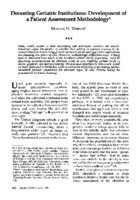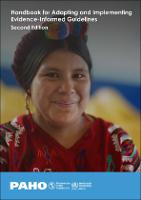Decanting geriatric institutions: Development of a patient assessment methodology
| dc.contributor.author | Warner, Morton M | es_ES |
| dc.date.accessioned | 2016-03-05T18:55:58Z | |
| dc.date.available | 2016-03-05T18:55:58Z | |
| dc.date.issued | s.d. | es_ES |
| dc.date.issued | 1991 | es_ES |
| dc.identifier.uri | https://iris.paho.org/handle/10665.2/27004 | |
| dc.description.abstract | Many elderly people in both developing and developed countries are institutionalized, often irrespective of whether their ability to function requires it. Increased attention is now being given to prospects for decanting geriatric institutions and planning new forms of care. However, methodologic difficulties exist, it being hard to determine how much of the institutionalized elderly population could be effectively accommodated by alternate forms of care requiring certain levels of social, physical, and mental capacity. The procedure described in this article, based on work performed in Barbados, seeks to assess the eligibility of an existing institutionalized geriatric population for alternate types of care, thereby laying the groundwork for future planning | en_US |
| dc.relation.ispartofseries | Bulletin of the Pan American Health Organization (PAHO);25(4),1991 | en_US |
| dc.subject | Geriatric Assessment | es_ES |
| dc.subject | Deinstitutionalization | es_ES |
| dc.subject | Developing Countries | es_ES |
| dc.subject | Surveys and Questionnaires | en_US |
| dc.subject | Health Services for the Aged | en_US |
| dc.subject | Barbados | es_ES |
| dc.title | Decanting geriatric institutions: Development of a patient assessment methodology | es_ES |
| dc.type | Journal articles | en_US |
| dc.rights.holder | Pan American Health Organization | en_US |
Files in this item
This item appears in the following Collection(s)
-
Pan American Journal of Public Health
Revista Panamericana de Salud Pública




